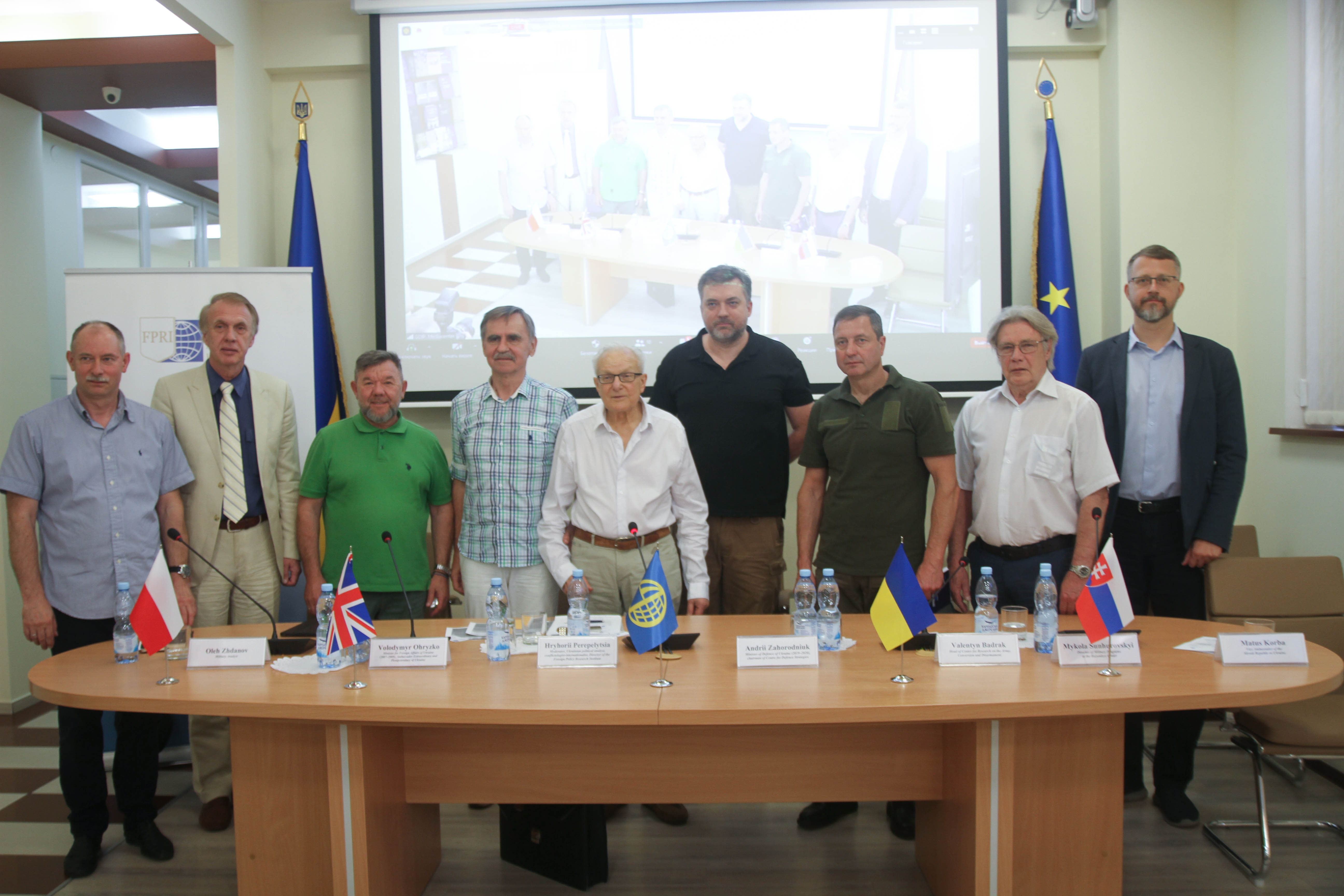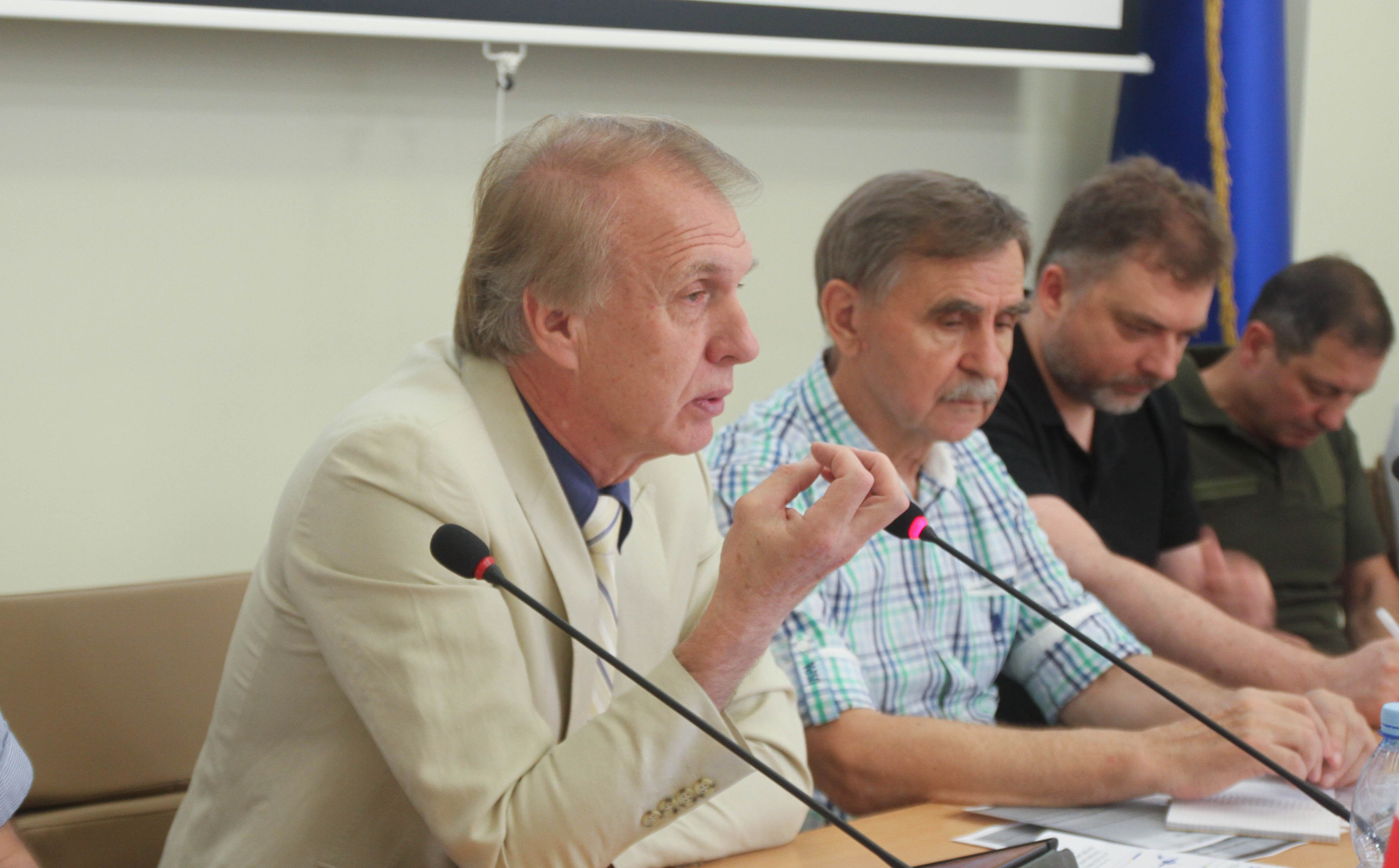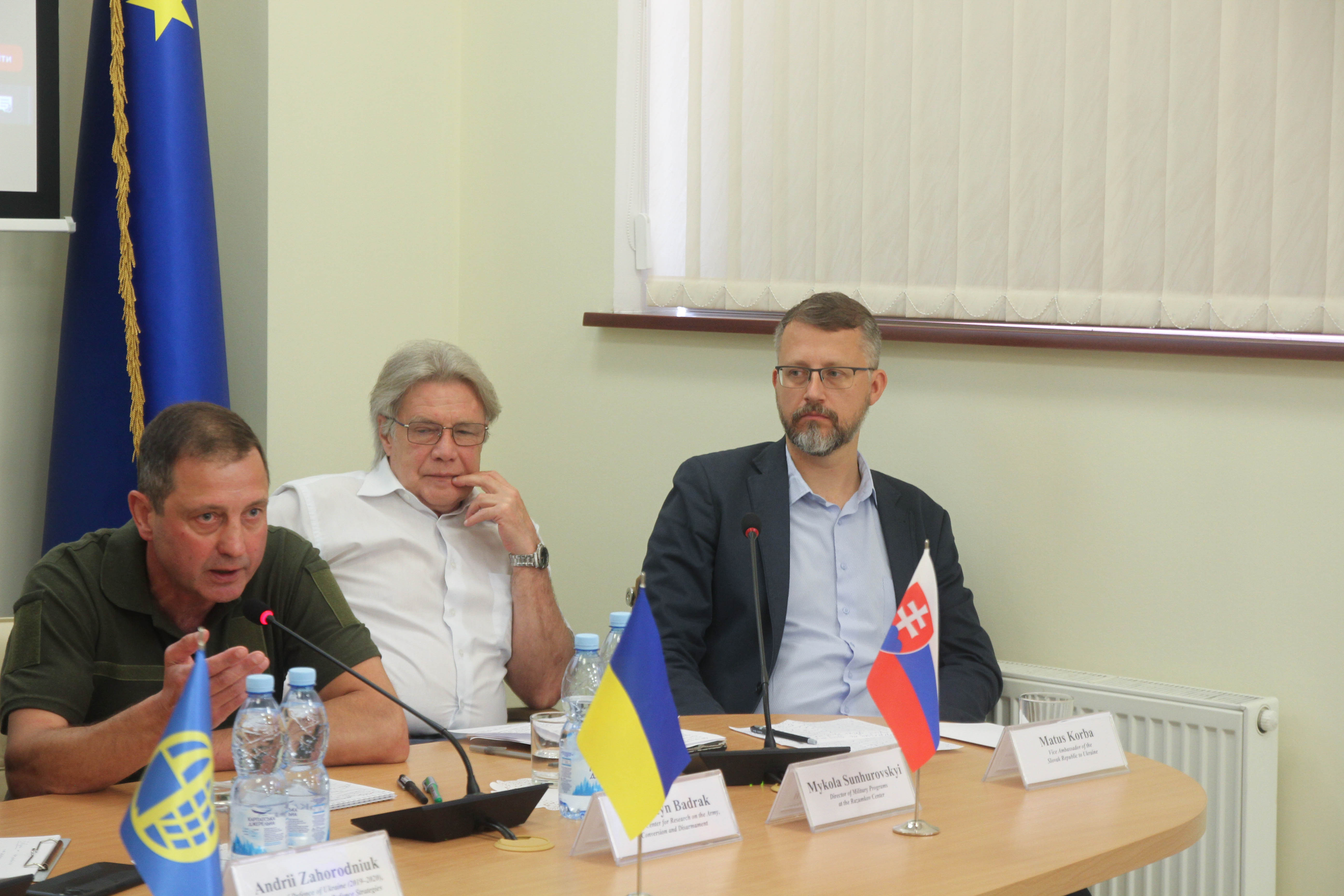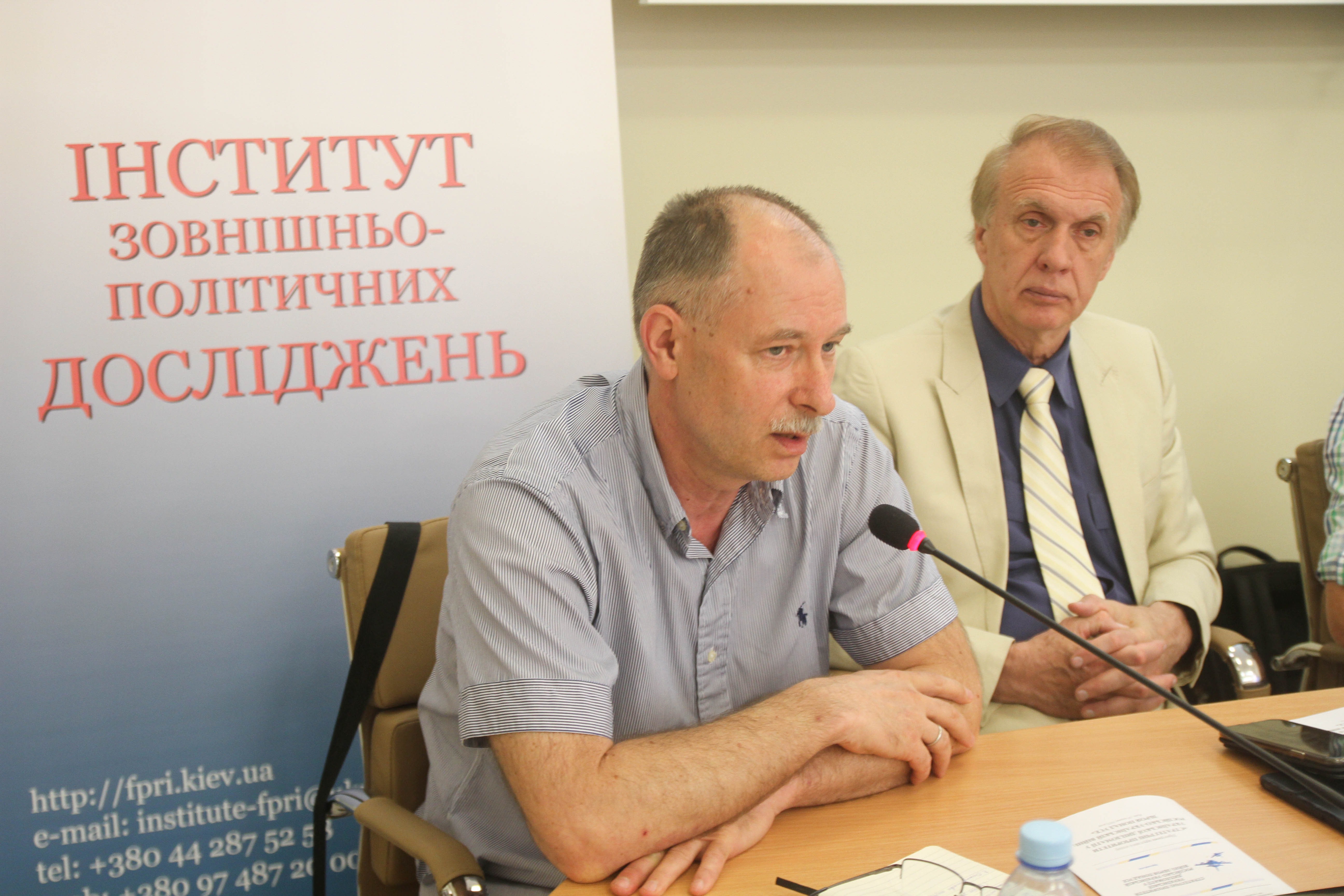
On 29 June, 2022, the Foreign Policy Research Institute assisted by the Directorate-General for Rendering Services to Diplomatic Missions held a round table discussion at the GDIP Media-Center on the subject: strategic priorities of Ukrainian diplomacy during the Russo-Ukrainian war – weapons above all else.
The speakers were: Hryhorii Perepelytsia, Director of the Foreign Policy Research Institute; Volodymyr Ohryzko, Minister for Foreign Affairs of Ukraine (December 2007 – March 2009), Ambassador Extraordinary and Plenipotentiary of Ukraine; Andrii Zahorodniuk, Minister of Defence of Ukraine (2019 – 2020), Head of the Centre for Defence Strategies; Valentyn Badrak – Director of the Centre of Army, Conversion and Disarmament Studies; Matus Korba, Deputy Ambassador of the Slovak Republic in Ukraine; Oleh Zhdanov, military analyst; Mykola Sunhurovskyi, Military Programmes Director at the Razumkov Centre.
The event was held under two slogans: Dmyrtro Kuleba’s quote “If Ukraine does not get weapons, we will fight with shovels” and the British destroyer Defender’s motto – “Defendendo vinco” (By defending I win). As usual, the round table began with an opening speech of Hryhorii Perepelytsia. The Director of the Foreign Policy Research Institute stressed on the stark reduction of arsenals inherited by Ukraine amidst the collapse of the Soviet Union. He believes, that had Ukraine preserved those conventional armaments, it would have averted the full-scale Russian aggression even in the absence of tactical nuclear weapons. However, Ukraine’s arsenals were subject to significant cuts and Russian aggression of 2014 failed to result in radical shift in the way Ukrainian leadership approached the development of domestic military-industrial complex as would be adequate in view of the military and political situation. Hryhorii Perepelytsia acknowledged Ukraine’s critical need for military aid and addressed the following problems:
- Losses in military equipment, especially in ammunition;
- Potential obstacles for rendering military aid to Ukraine, including due to diplomatic efforts of Russia, which actively seeks to persuade Ukraine’s western partners to cut aid;
- Concerns of Italian, French and German leadership, that Ukraine’s victory in the war against Russia would lead to Vladimir Putin “losing face”.
The key question of the discussion was “Whether Ukraine will be able to achieve military victory with the West’s assistance?”

The first speaker of the event Volodymyr Ohryzko acknowledged the interdependence of the military and diplomatic frontlines. Mr. Ohryzko proposed the concept of “Denying Russia”, stating that Russia constitutes an existential threat to the entire civilized world. Ex-Minister voiced several key arguments:
- Assigning the status of the main threat to the Euro-Atlantic security architecture to Russia gave key importance to the NATO summit in Madrid and shall serve to end the “pointless discussions about the one security roof from Vancouver to Vladivostok”. “The West has reached its moment of truth, moment of enlightenment”;
- The future global security system must not include Russia”;
- NATO must undergo a shift in responsibilities from regional security (Northern Atlantic) to the global level in order to safeguard western liberalism and combat the global authoritarianism;
- Should NATO allow Russia to overtake the Baltic countries, it will find itself liberating razed territories. “In 30 days, Tallinn will turn into Bucha, Vilnius into Hostomel and Riga into Borodianka. In 60 days, all ‘local national minorities’, as Russia would call them, will end up in Siberia”;
- Now is the time to begin the discussion of what happens to Russia after the war. Mr. Ohryzko believes that the Russian Federation shall not have political perspectives, i.e. at the minimum, it must be brought to such economic conditions, where it would be rendered incapable of continuing its aggressive policy;
- Should the civilized world fail to act decisively today, it will find itself facing the same problem Ukraine has. However, by then it will involve not only Ukraine, but the West in general.
Andrii Zahorodniuk acknowledged the critical role of military aid in the future victory of Ukraine. Mr. Zahorodniuk identified two dimensions of the issue of military aid:
1) Logistical (preparation and transportation of military equipment. Troops often require training to be able to use certain types of weapons)
2) Political
Andrii Zahorodniuk believes, that NATO became the main disappointment of the war. In its operation in Afghanistan, the Alliance has proven its ability to make operational decisions and coordinate actions of member-states. Thus, its failure to supply Ukraine with lethal aid emanates from the concept of ‘escalation’. The term is used routinely regardless of context. Many countries simply fear Russia, and many have been subject to threats by Russia, including threats of use of force.
Nevertheless, the processes of rendering aid to Ukraine are ongoing and many pro-Ukrainian actors promote increased assistance, including within the USA. Such actors include think tanks, journalists and activists. Thus, the solution to the issue of catastrophic lack of military equipment is based on a matter of time. According to the ex-Minister, Russia will eventually exhaust its potential, while Ukraine will achieve the opposite – its increase. Andrii Zahorodiniuk anticipates a potential turning point of the war in Autumn. Once our partners see Ukraine take the initiative, they will bolster the support.
In his rather emotive, yet professional and composed speech, Valentyn Badrak focused on the issue of military and technical cooperation. The expert noted that he is observing irritation from certain partners of Ukraine due to its insufficient drive to modernise in the past 8 years. At the same time, he highlighted successful initiatives of the Ukrainian Government, such as the purchase of Bayraktar UAVs and the joint project with Britain on missile boats.
Valentyn Badrak stated, that Ukraine entered the war as unprepared as Europe did. He stressed such negative factors influencing the situation in Ukraine as weakness of NATO, ambiguous stance of the leaders of Germany and France and the delays in supply of weapons along with supply of obsolete models of equipment in place of more recent ones. Those factors result in the artificial delay of counter-offensive. “Should Ukraine fall, Russia will reach the borders of Germany and France in several weeks. Countries of Central and Eastern Europe do not have wartime experience and as such they lack generals of our skill” said the expert. He believes that Ukraine could cover the need for military equipment by developing domestic technologies, beginning from RK-3 Corsar and Stuhna and up to the MRL Vilkha-M, in addition to joint projects, such as Bayraktar Ak?nc?, which incorporate Ivchenko-Progress engines. Mr. Badrak also suggested the manufacturing of over 1,000 Kamikaze drones, allowing for the implementation of “proper mosquito strike strategies”.
Matus Korba, Deputy Ambassador of the Slovak Republic in Ukraine, began his speech with praising the good-neighbourly relations of Ukraine and Slovakia and the consistent stance of Slovakia on respecting Ukraine’s territorial integrity. “Over the past four years, we have rendered military support of 153 million EUR to Ukraine. When we recalculate this number as per capita, then Slovakia appears to be in the top thirty countries, who support Ukraine militarily. This number – 153 million EUR – constitutes a large portion of Slovak defence budget for 2022. This means, that Bratislava is well aware that the Armed Forces of Ukraine are defending not just their own country, but ours as well” declared the diplomat.
Matus Korba also highlighted several specific instances of his country assisting Ukraine: supply of S-300 missile systems (Slovakia was the first state to send such systems to Ukraine), Zuzana 2 Gun Howitzers, Mi-17 military helicopters, ammunition for Grad MRL, fuel. Slovak defence companies are now also working on repairing and modernising Ukrainian equipment. Moreover, Slovakia is willing to supply the T72 tanks, however the final decision is dependent on negotiations with Germany. Matus Korba expressed hope for continued military assistance to Ukraine.

Oleh Zhdanov, one of Ukraine’s leading military analysts, stated that Ukraine boasts a robust military industrial-complex, capable of manufacturing almost all kinds of weapons including missile systems. Ukraine is among the only five countries in the world to possess such capacity. However, according to the expert, due to the unending complications with defence procurement, right now the state is entirely dependent on weapons supplied by states-partners, which is being delivered to the frontlines immediately upon arrival. Oleh Zhdanov noted that the USA currently play the key role in this process. The country has established the Rammstein coordination platform, provides significant funding and currently seeks to reboot its military industrial-complex.
In his evaluation of the collective defence system, the expert stated, that the future belongs to regional alliances. To give weight to this argument he provided examples of the UN Security Council, which has failed to exercise its functions, and NATO, which “no longer functions as a political organisation”
Mr. Zhdanov also brought up the issue of the vision of post-war Europe. He believes that France and Germany cannot see the world in which Ukraine has won, only understanding the one where Russia exists. Therefore, those countries are not interested in Ukraine emerging from the war as the most [militarily] powerful state of Europe. “Such is the paradox that will arise on the European Continent, should we win”.
Regarding the Russian Federation, the expert argued that Russia is incapable of waging prolonged war: “When it comes to the military-industrial complex, they have shut down all of their programs, they are running out of modern armaments”. On the other hand, Ukraine is receiving from the West evermore precise, long-range, technologically advanced and high-quality weapons. When this supply is finally in the hundreds of units, we will be able to discuss a counter-offensive. Ukraine’s goal is to withstand until that happens. One of the primary questions that demands an answer for the further development of Armed Forces, according to Oleh Zhdanov, is whether Ukraine will develop its own military-industrial complex, or purchase weapons in the open market of international armaments.

Mykola Sunhurovskyi, Military Programmes Director at Razumkov Centre, began his speech with a historical overview, wherein he emphasised the corruption and inefficient funding in the defence sector. Mr. Sunhurovskyi noted, that while NATO receives critique, it is the European Union that regulates weapons exports in Europe, not the North Atlantic Treaty Organisation. Thus, the crux of the problem, according to the expert, lies with the absence of political will from certain politicians. “Realpolitik without morals is a crime” he added. The issue of political will was further raised in context of future participation of Russia in the UN, as well as providing military assistance to Ukraine.
Mykola Sunhurovskyi proposed the term “regulated victory”, which implies a scenario, wherein Ukraine receives as many weapons as it requires to re-establish control over territories held as of 23 February. Such a scenario is not acceptable to Ukraine, creating a dilemma of “How should [Ukraine] be calling for this aid?”
The round table concluded with the speech of Volodymyr Andriiovych Vasylenko, Ambassador Extraordinary and Plenipotentiary of Ukraine, who addressed the following matters:
- The absence of adequate action in the legal sphere against Russia emanating from the Ukrainian authorities, even after the 2014 aggression;
- The importance of effective operation in the capitals of NATO member-states;
- The necessity of building Ukrainian foreign policy based on understanding of Russian strategic interest, i.e. the destruction of Ukrainian statehood;
- Feasibility of raising the bar in negotiations with states-partners regarding the means of strengthening Ukrainian security;
- Directing more effort towards the active and persistent work on forming the anti-Putin coalition.
The round table was joined by representatives of Embassies of Armenia and Georgia, international and non-governmental organisations, Ukrainian diplomats, experts, servicemen, representatives of domestic military-industrial complex, scientists and correspondents from ArmyInform and Defense Express.
Before the end of the conference, the guests had an opportunity to voice their comments.
29 June 2022
